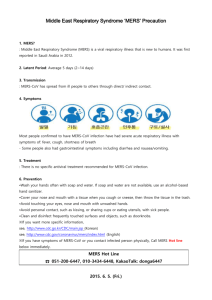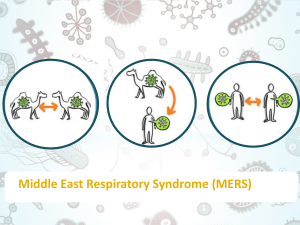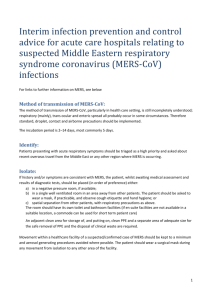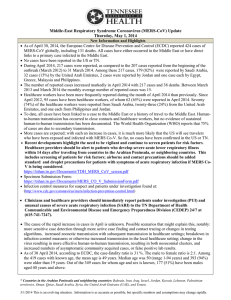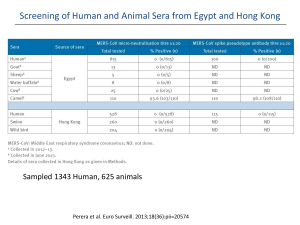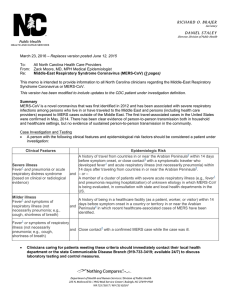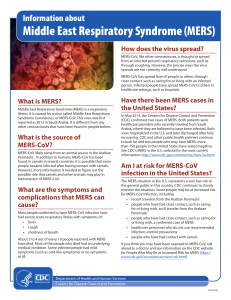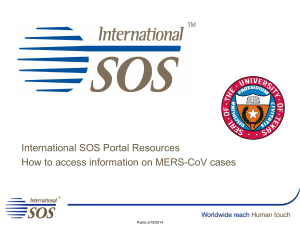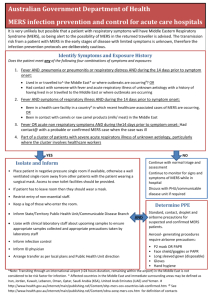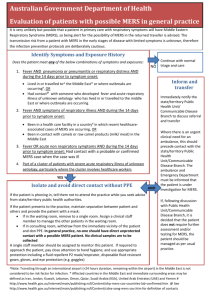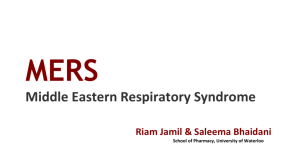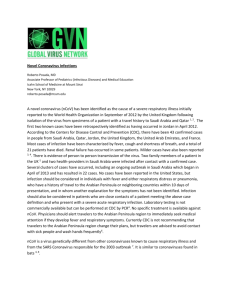MERS-CoV Infection Update - Wisconsin Hospital Association
advertisement
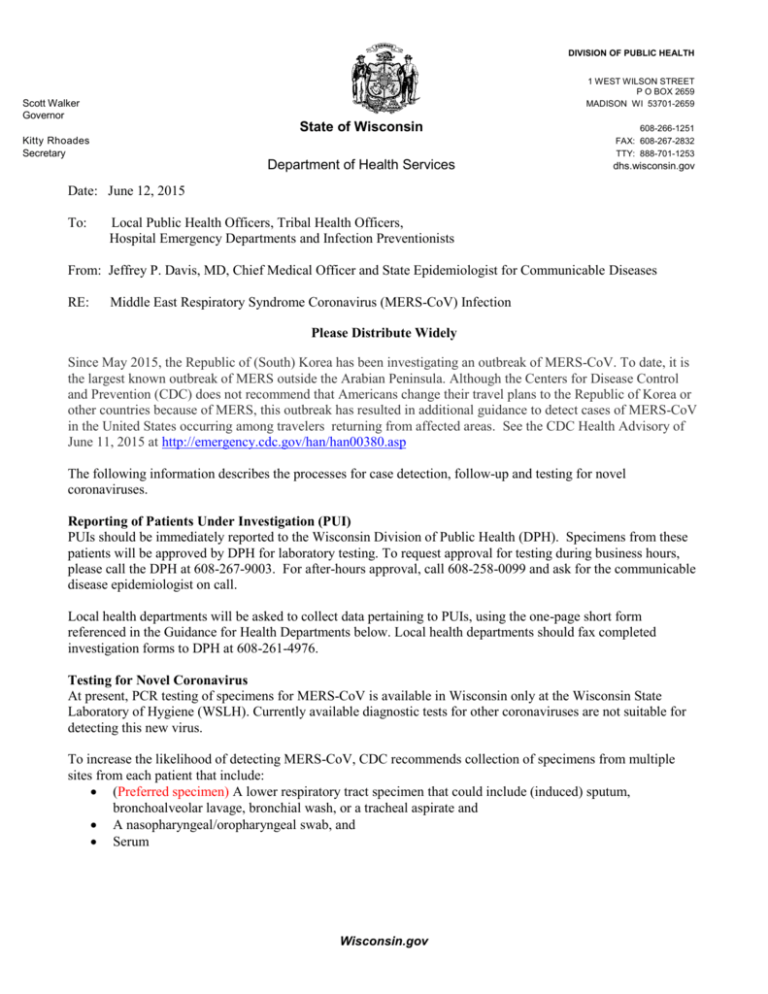
DIVISION OF PUBLIC HEALTH 1 WEST WILSON STREET P O BOX 2659 MADISON WI 53701-2659 Scott Walker Governor State of Wisconsin 608-266-1251 FAX: 608-267-2832 TTY: 888-701-1253 Department of Health Services dhs.wisconsin.gov Kitty Rhoades Secretary Date: June 12, 2015 To: Local Public Health Officers, Tribal Health Officers, Hospital Emergency Departments and Infection Preventionists From: Jeffrey P. Davis, MD, Chief Medical Officer and State Epidemiologist for Communicable Diseases RE: Middle East Respiratory Syndrome Coronavirus (MERS-CoV) Infection Please Distribute Widely Since May 2015, the Republic of (South) Korea has been investigating an outbreak of MERS-CoV. To date, it is the largest known outbreak of MERS outside the Arabian Peninsula. Although the Centers for Disease Control and Prevention (CDC) does not recommend that Americans change their travel plans to the Republic of Korea or other countries because of MERS, this outbreak has resulted in additional guidance to detect cases of MERS-CoV in the United States occurring among travelers returning from affected areas. See the CDC Health Advisory of June 11, 2015 at http://emergency.cdc.gov/han/han00380.asp The following information describes the processes for case detection, follow-up and testing for novel coronaviruses. Reporting of Patients Under Investigation (PUI) PUIs should be immediately reported to the Wisconsin Division of Public Health (DPH). Specimens from these patients will be approved by DPH for laboratory testing. To request approval for testing during business hours, please call the DPH at 608-267-9003. For after-hours approval, call 608-258-0099 and ask for the communicable disease epidemiologist on call. Local health departments will be asked to collect data pertaining to PUIs, using the one-page short form referenced in the Guidance for Health Departments below. Local health departments should fax completed investigation forms to DPH at 608-261-4976. Testing for Novel Coronavirus At present, PCR testing of specimens for MERS-CoV is available in Wisconsin only at the Wisconsin State Laboratory of Hygiene (WSLH). Currently available diagnostic tests for other coronaviruses are not suitable for detecting this new virus. To increase the likelihood of detecting MERS-CoV, CDC recommends collection of specimens from multiple sites from each patient that include: (Preferred specimen) A lower respiratory tract specimen that could include (induced) sputum, bronchoalveolar lavage, bronchial wash, or a tracheal aspirate and A nasopharyngeal/oropharyngeal swab, and Serum Wisconsin.gov Current specimen collection guidance is available at http://www.cdc.gov/coronavirus/mers/guidelines-clinicalspecimens.html . The DPH will approve requests for tests to be conducted at the WSLH if a patient meets the CDC criteria described below. Clinical Features Severe illness Fever and pneumonia or acute respiratory distress syndrome (based on clinical or radiological evidence) Milder illness Fever and symptoms of respiratory illness (not necessarily pneumonia; e.g., cough, shortness of breath) Epidemiologic Risk A history of travel from countries in or near the Arabian Peninsula1 and within 14 days before symptom onset, or close contact2 with a symptomatic traveler who developed fever and acute respiratory illness (not necessarily pneumonia) within 14 days after traveling from countries in or near the Arabian Peninsula1. – or – A history of being in a healthcare facility (as a patient, worker, or visitor) in the Republic of Korea within 14 days before symptom onset. (New Guidance) – or – A member of a cluster of patients with severe acute respiratory illness (e.g., fever and pneumonia requiring hospitalization) of unknown etiology in which MERS-CoV is being evaluated, in consultation with state and local health departments in the US. A history of being in a healthcare facility (as a patient, worker, and or visitor) within 14 days before symptom onset in a country or territory in or near the Arabian Peninsula in which recent healthcare-associated cases of MERS have been identified. – or – Close contact2 with a confirmed MERS case while the case was ill. 1 Countries considered in the Arabian Peninsula and neighboring include: Bahrain; Iraq; Iran; Israel, the West Bank, and Gaza; Jordan; Kuwait; Lebanon; Oman; Qatar; Saudi Arabia; Syria; the United Arab Emirates (UAE); and Yemen . 2 Close contact is defined as: a) being within approximately 6 feet (2 meters) or within the room or care area for a prolonged period of time (e.g., healthcare personnel, household members) while not wearing recommended personal protective equipment (i.e., gowns, gloves, respirator, eye protection); or b) having direct contact with infectious secretions (e.g., being coughed on) while not wearing recommended personal protective equipment (i.e., gowns, gloves, respirator, eye protection). Guidance for Health Departments (CDC) Middle East Respiratory Syndrome (MERS) Patient Under Investigation (PUI) Short Form http://www.cdc.gov/coronavirus/mers/downloads/mers-investigation-short-form.pdf Interim Home Care and Isolation Guidance for MERS-CoV http://www.cdc.gov/coronavirus/MERS/hcp/home-care.html Guidance for Healthcare Providers, Infection Control (CDC) Interim Infection Prevention and Control Recommendations for Hospitalized Patients with Middle East Respiratory Syndrome Coronavirus (MERS-CoV) http://www.cdc.gov/coronavirus/mers/infection-prevention-control.html Guidance for Virus Shipping and Outbreak Enhanced Surveillance Requisition Form (WSLH) http://www.slh.wisc.edu/wcln-surveillance/surveillance/virology-surveillance/ Questions or concerns regarding this memo can be directed to - Thomas Haupt 608-266-5326, e-mail Thomas.Haupt@wi.gov, or the Bureau of Communicable Diseases main phone number, 608-267-9003.
